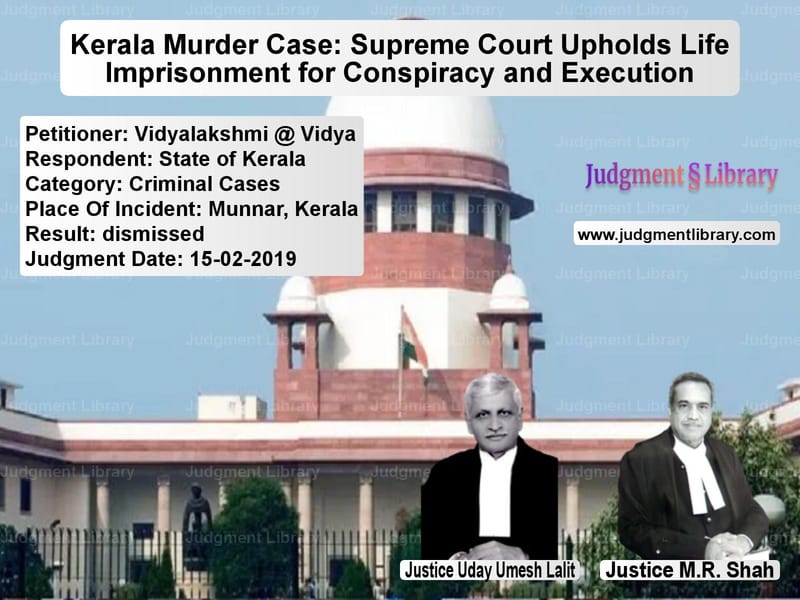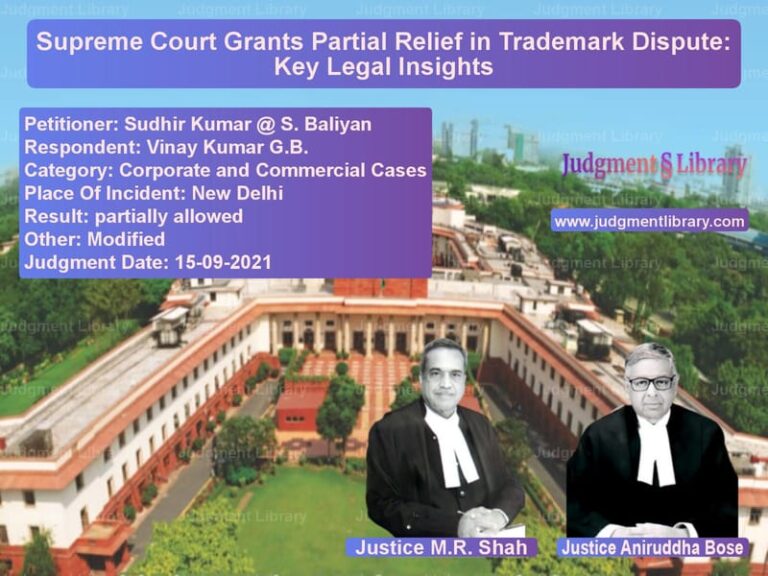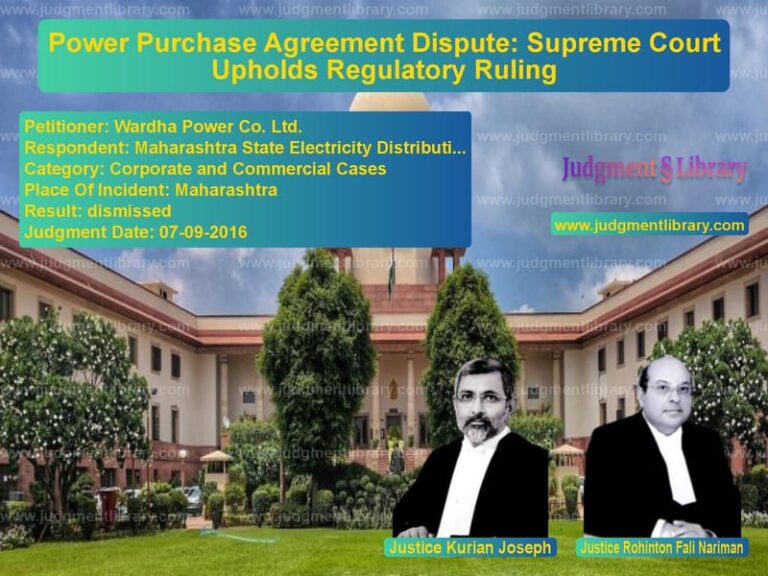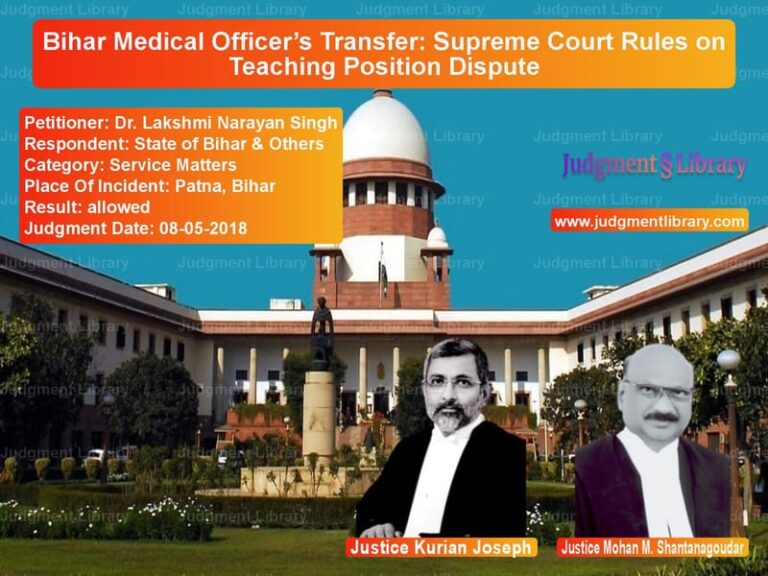Kerala Murder Case: Supreme Court Upholds Life Imprisonment for Conspiracy and Execution
The Supreme Court of India, in the case of Vidyalakshmi @ Vidya vs. State of Kerala, delivered a significant judgment affirming the conviction and life sentences of three accused in a premeditated murder case. The case revolved around a woman conspiring with her lover and an accomplice to murder her husband during their honeymoon trip. The judgment reinforces the principles of circumstantial evidence, conspiracy, and the necessity of proving an unbroken chain of events leading to the crime.
Background of the Case
The case dates back to June 2006, when Vidyalakshmi (A3) married Anandaraman against her will in Chennai. She was allegedly in a long-standing romantic relationship with Anand Sabariraj (A1), whom she continued seeing after her marriage. Unwilling to remain in the marital relationship, she conspired with Anand and his friend Murugan (A2) to murder her husband.
According to the prosecution, Vidyalakshmi lured her husband to Kerala for a honeymoon trip. She maintained communication with Anand through her mobile phone, updating him on their travel plans. Anand and Murugan followed the couple through their journey, waiting for the right moment to execute their plan.
On June 18, 2006, at Kundala Dam in Munnar, Kerala, Vidyalakshmi allegedly led her husband to a secluded area. Anand and Murugan ambushed Anandaraman, strangled him using a camera strap (MO.7), and smothered him. After ensuring his death, they looted his valuables, including Rs. 13,000 in cash, a wristwatch, and a camera, and then fled the scene.
Vidyalakshmi, in an attempt to mislead the police, fabricated a story that unknown miscreants attacked them and killed her husband. However, the investigation uncovered the conspiracy, leading to the arrest and prosecution of all three accused.
Trial Court Conviction
The prosecution presented a strong case based on circumstantial evidence, witness testimonies, and forensic reports. The key pieces of evidence included:
- Mobile call records showing frequent communication between Vidyalakshmi and Anand before and during the trip.
- Recovery of stolen items from Anand and Murugan.
- Bloodstains and hair clippings found at the crime scene.
- Eyewitness accounts from hotel managers and local transport operators confirming the presence of the accused near the victim throughout the trip.
- The recovery of the couple’s travel itinerary from Anand, which was in Vidyalakshmi’s handwriting.
Based on this evidence, the Trial Court found all three accused guilty and sentenced them as follows:
- Anand (A1) – Life imprisonment for murder (Section 302 IPC), along with additional sentences for conspiracy and robbery.
- Murugan (A2) – Life imprisonment for murder and robbery.
- Vidyalakshmi (A3) – Life imprisonment for murder with the aid of Section 114 IPC, conspiracy, and abetment.
The sentences were ordered to run concurrently.
High Court Appeal
The convicts appealed their conviction and sentence before the Kerala High Court. However, after a thorough re-examination of the evidence, the High Court dismissed the appeals, upholding the Trial Court’s findings. The High Court ruled that:
- The prosecution had successfully established an unbroken chain of events proving the involvement of all three accused.
- The call records and travel itinerary provided strong corroboration of the conspiracy.
- The theory of unknown assailants was fabricated and did not align with the forensic evidence.
- The accused failed to provide any plausible explanation for their presence at key locations during the crime.
Supreme Court’s Verdict
The three convicts further challenged their conviction before the Supreme Court of India. The defense argued that:
- The case was based on circumstantial evidence, which was not sufficient for conviction.
- The prosecution failed to prove the conspiracy beyond reasonable doubt.
- Vidyalakshmi had no motive to kill her husband as she was happy in her marriage.
- The recovery of the itinerary from Anand was fabricated evidence.
The Supreme Court, however, dismissed these arguments and upheld the conviction, ruling that:
“The prosecution has been successful in proving the chain of circumstances leading to the only conclusion that the accused conspired and executed the murder of the deceased.”
The Court further observed:
“The presence of A1 and A2 at Guruvayoor, Munnar, and Echo Point was sufficiently proved through multiple witnesses, making their involvement undeniable.”
Additionally, the Court ruled:
“The unbroken chain of events, corroborated by forensic and documentary evidence, leaves no doubt regarding the guilt of the accused.”
Accordingly, the Supreme Court dismissed the appeals and confirmed the life sentences awarded to all three accused.
Key Takeaways from the Judgment
- Circumstantial Evidence Can Lead to Conviction: The case reaffirms that a well-established chain of circumstantial evidence can be sufficient for conviction.
- Mobile Call Records as Crucial Evidence: The Supreme Court relied heavily on mobile call records to prove the conspiracy.
- Robbery as an Additional Offense: The accused were also convicted for robbery since they looted the victim’s belongings after the murder.
- False Narratives Can Be Unraveled: Vidyalakshmi’s attempt to mislead investigators was exposed through meticulous police work and forensic evidence.
- Life Imprisonment as a Strong Deterrent: The case sets a precedent that premeditated murders involving conspiracy will attract strict penalties.
Conclusion
The Supreme Court’s ruling in Vidyalakshmi @ Vidya vs. State of Kerala reinforces the importance of circumstantial evidence in murder trials. The case serves as a reminder that even in the absence of direct eyewitnesses, a carefully constructed chain of events, corroborated by forensic and electronic evidence, can establish guilt beyond a reasonable doubt. The judgment underscores the principle that justice must be served even in cases where the accused attempt to fabricate false narratives to escape liability.
Petitioner Name: Vidyalakshmi @ Vidya.Respondent Name: State of Kerala.Judgment By: Justice Uday Umesh Lalit, Justice M.R. Shah.Place Of Incident: Munnar, Kerala.Judgment Date: 15-02-2019.
Don’t miss out on the full details! Download the complete judgment in PDF format below and gain valuable insights instantly!
Download Judgment: Vidyalakshmi @ Vidya vs State of Kerala Supreme Court of India Judgment Dated 15-02-2019.pdf
Direct Downlaod Judgment: Direct downlaod this Judgment
See all petitions in Murder Cases
See all petitions in Attempt to Murder Cases
See all petitions in Judgment by Uday Umesh Lalit
See all petitions in Judgment by Mukeshkumar Rasikbhai Shah
See all petitions in dismissed
See all petitions in supreme court of India judgments February 2019
See all petitions in 2019 judgments
See all posts in Criminal Cases Category
See all allowed petitions in Criminal Cases Category
See all Dismissed petitions in Criminal Cases Category
See all partially allowed petitions in Criminal Cases Category







